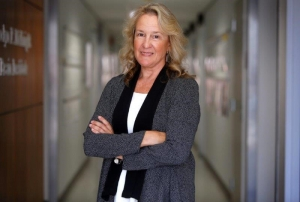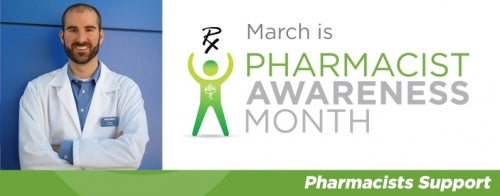The Daily Bulletin is published by Internal and Leadership Communications, part of University Communications
Contact us at bulletin@uwaterloo.ca
Submission guidelines
Editor:
Brandon Sweet
University Communications
bulletin@uwaterloo.ca
Renowned neuroscientist Carol Barnes will present the University of Waterloo’s 2017 Hagey Lecture this week and discuss how memory and the brain change during normal aging, as well as some of the current thinking about ways to optimize mental functions throughout life.
 Professor Barnes is a Regents’ Professor in the Departments of Psychology, Neurology and Neuroscience, the Evelyn F. McKnight Endowed Chair for Learning and Memory in Aging, director of the Evelyn F. McKnight Brain Institute, and director of the Division of Neural Systems, Memory & Aging at the University of Arizona in Tucson. Barnes received the 2013 Gerard Prize in Neuroscience and the 2014 American Psychological Association Award for Distinguished Scientific Contributions.
Professor Barnes is a Regents’ Professor in the Departments of Psychology, Neurology and Neuroscience, the Evelyn F. McKnight Endowed Chair for Learning and Memory in Aging, director of the Evelyn F. McKnight Brain Institute, and director of the Division of Neural Systems, Memory & Aging at the University of Arizona in Tucson. Barnes received the 2013 Gerard Prize in Neuroscience and the 2014 American Psychological Association Award for Distinguished Scientific Contributions.
Memory and the Aging Brain takes place on Wednesday, March 22 at 8:00 p.m. in the Humanities Theatres. Doors for the sold-out event open at 7:30 p.m.
The Hagey Lecture is Waterloo's premier invitational public lecture series, named in honour of the first president of the University. The University and the Faculty Association of the University of Waterloo co-sponsor this free event.

The Pharmacists Support series is issued by the School of Pharmacy for #PAM2017. It runs every Tuesday and Thursday in March.
“At work, I have been spat on, splattered with hot coffee, had death threats, and called every horrible insult you can think of. In my line of work, I cannot take these things personally. My patients lead a hard life, and on the street that is how things are dealt with.”
Greg Becotte is a pharmacist at the Pier Health Resource Center in Vancouver’s Downtown Eastside (DTES). The DTES is a neighbourhood notorious for high rates of poverty, mental illness, crime, and infectious disease. Pier Health’s team ensures access to healthcare services for the neighbourhood and provides outreach treatment to the 1500 sheltered and homeless residents and the 3500 residents who live in local hotels.
Though his work can be emotionally draining, Greg knows he’s making a difference in Vancouver’s struggle against public health issues like opioid addiction and overdose. He provides tools like naloxone, the temporary antidote to opioid overdose, and even saved a woman’s life administering naloxone while on the job.
The University is hosting an expert panel and Q and A to address gender violence on campus with specific attention to institutional challenges and University of Waterloo's response.
Gendered Violence on Campus: Institutional Policy and Practice coincides with the recent implementation of the University of Waterloo’s Policy 42, Prevention and Response to Sexual Violence. University and community members are invited to engage in a dialogue about this important issue and its impact on campus and beyond.
With moderation by Jennifer S. Simpson, chair of the Department of Drama and Speech Communication, the panelists include:
The panel takes place on Thursday, March 23 from 3:30 p.m. to 5:00 p.m. in QNC 0101. RSVP to reserve seats for this free event.
Policy 42 Prevention and Response to Sexual Violence (PDF) establishes the University’s commitment to the awareness and prevention of Sexual Violence and to a process for addressing complaints of Sexual Violence.
This panel is co-hosted by the Department of Drama and Speech Communication, the Equity Office, and the Special Adviser to the President on Gender and Equity Issues. The panel is part of a series of initiatives related to the issue, including the Theatre and Performance production, Unconscious Curriculum: Rape Culture on Campus.
The Centre for Teaching Excellence is running CTE908, "Documenting Your Teaching for Tenure and Promotion" on Wednesday, March 29 from 11:45 a.m. to 1:15 p.m. in NH 3407. This workshop is open to faculty and staff, but registration is required.
"Tenure and promotion are critical milestones in a faculty member's career," says the course description. "You need to collect evidence and document your successes in research, teaching, and service for various individuals and committees to assess. Although many faculty are well prepared to document their research and even service, evidence of good teaching can be more difficult to provide. You will learn about best practices used at other institutions - primarily the teaching dossier - for you to use or adapt in relation to the criteria identified by your Department Chair or School Director. There will be time for questions throughout the session."
The session will be moderated by Associate Vice-President, Academic Mario Coniglio and includes the following panel members:
"Join us for lunch (vegetarian, dairy-free and gluten-free options will be provided) and a chance to find out how others have been successful at documenting their teaching as part of being granted tenure at Waterloo, and network with your colleagues to help build a community that can help support you to your successful tenure application and beyond."
Please register today for catering purposes.
Give feedback. Get change. Students still have an opportunity to complete the National Survey of Student Engagement (NSSE). This survey goes out to all first-year and graduating undergraduate students, giving them the opportunity to tell us about their educational experience at Waterloo: How good is the academic advising? How accessible are faculty members and campus services? How has co-op/study abroad/practicum opportunities helped to acquire a job?
These questions and more have been sent to students via their @uwaterloo.ca accounts. The survey takes 15-20 minutes to complete and will be available to students until April 4, 2017. Students that submit their survey responses will receive a $5 added to their Watcard and will be entered in a draw to win $500 and other weekly prizes.
Visit the NSSE 2017 website for more information about this year’s survey. Additional information about the NSSE survey at Waterloo can be found on the IAP website.
Think you should be in pictures? Marketing and Undergraduate Recruitment is looking for undergraduate students to be in photoshoots for admissions publications and websites. Details and registration are available on the MUR website.
Here's the latest Nutrition Month "myth vs. fact" supplied by Health Services Dietician Sandra Ace:
Myth: Eating less fat helps to prevent heart disease.
Fact: For many years, healthy eating guidelines to lower heart disease risk focused on eating less fat and fewer foods high in dietary cholesterol, like eggs. What current research shows is that the best diet to prevent heart disease is rich in vegetables and fruits, whole grains, nuts, fish (especially fatty fish like salmon), lean protein, lower fat dairy products and plant oils like olive oil. A heart-healthy diet also limits sugar, refined carbohydrates and foods high in sodium and saturated fats or trans fats. The Heart and Stroke Foundation of Canada estimates that 80 per cent of premature heart disease and stroke can be prevented by lifestyle choices including maintaining a healthy weight, eating a heart-healthy diet, staying active, not smoking and managing stress.
Sustainable Campus Photo Contest, Monday, March 20 – Friday, April 21, across campus.
Electrical and Computer Engineering Capstone Design Symposium, Tuesday, March 21, 9:30 a.m. to 4:00 p.m., DC atrium.
NEW - Working Effectively in Another Culture, Tuesday, March 21, 12:30 p.m., TC - William M. Tatham Centre room 1208.
Career Booster German(y), a panel discussion, information fair and reception hosted by the UW Dept. of Germanic and Slavic Studies and Goethe-Institut Toronto, Tuesday, March 21, 4:00 p.m. to 6:30 p.m., Mike & Ophelia Lazaridis Quantum-Nano Centre, QNC 0101.
World Water Day, Wednesday, March 22, Wilfrid Laurier University Lazaridis Hall.
Research Opportunities with Germany, Wednesday, March 22, 10:00 a.m. to 11:00 a.m., William G. Davis Computer Research Centre (DC 1304). Please register.
NEW - Translating Academic Experience to Industry for PhDs/Postdocs, March 22, 10:00 a.m., TC - William M. Tatham Centre room 1208
Translating Academic Experience to Industry for PhDs/Postdocs, Wednesday, March 22, 10:00 a.m., TC - William M. Tatham Centre room 1208.
Exploring Your Personality Type – Myers-Briggs Type Indicator Part 2, Wednesday, March 22, 10:30 a.m., TC - William M. Tatham Centre room 1112.
WISE seminar featuring Professor Josh Taylor, Department of Electrical & Computer Engineering, University of Toronto, "Leveraging Energy Storage and Demand Response in Power System Operations," Wednesday, March 22, 10:30 a.m., EIT 3142.
Paving the way for excellent dementia care and support: A three-part education initiative: “Enhancing communication in dementia care,” Wednesday, March 22, 11:30 a.m., DC 1302.
How to be an Exceptional Employee, Wednesday, March 22, 2:30 p.m., TC - William M. Tatham Centre room 1208
Velocity Start: The Startup Rollercoaster, Wednesday, March 22, 7:30 p.m., Velocity Start, SCH 2nd Floor.
Hagey Lecture: “Memory and the Aging Brain,” featuring Carol Barnes, Wednesday, March 22, 8:00 p.m., Humanities Theatre.
Hagey Lecture Student Colloquium, "The ‘Young Field’ of Neuroscience: One senior scientist’s retrospective," with Dr. Carol Barnes, Thursday, March 23, 10:00 a.m., LHI 1620.
School of Computer Science Distinguished Lecture Series featuring Daniel Alan Spielman, “The Laplacian Matrices of Graphs: Algorithms and Applications,” Thursday, March 23, 3:30 p.m., DC 1302.
Three-Minute Thesis (3MT) finals, Thursday, March 23, 3:00 p.m., Theatre of the Arts.
Gendered Violence on Campus: Institutional Policy and Practice, Thursday, March 23, 3:30 p.m., QNC 0101.
UUfie - Recent Projects, Thursday, March 23, 6:00 p.m., Cummings Lecture Theatre, School of Architecture.
Colourful X-rays featuring Electrical and Computer Engineering Professor Karim S. Karim, Friday, March 24, 12:00 p.m. to 1:00 p.m. Please register. Seating is limited.
Knowledge Integration seminar: “Building smarter organizations”, featuring Gordon Vala-Webb, Friday, March 24, 2:30 p.m., EV3-1408.
Further Education Boot Camp, Saturday, March 25, 10:00 a.m., TC 2218.
Canadian Interdisciplinary Vision Rehabilitation Conference, Saturday, March 25 and Sunday, March 26, School of Optometry and Vision Science.
Implementing the Sustainable Development Goals: Identifying Critical Steps for Canadian Impact, featuring Dr. Jeffrey Sachs and his wife Dr. Sonia Elrich Sachs, Tuesday, March 28, 11:00 a.m., Federation Hall.
TD Walter Bean Lecture in Environment featuring Jeffrey Sachs, "Rising Nationalism versus Global Cooperation for Sustainable Development," Tuesday, March 28, 5:00 p.m., Humanities Theatre.
CBB Workshop: UWaterloo Intellectual Property Part 4 -Trademarks, Trade Secrets, Industrial Designs, Wednesday, March 29, 10:30 a.m., QNC 1501.
NEW - Documenting Your Teaching for Tenure and Promotion (CTE908), Wednesday, March 29, 11:45 a.m., NH 3407. Please register.
Beyond 60 Lecture: From Connected to Autonomous, Wednesday, March 29, 6:00 p.m., University of Waterloo Stratford Campus.
NEW - Green Office Energy Challenge, Thursday, March 30 to Friday, April 21, across campus.
Velocity Fund Finals, Thursday, March 30, 11:00 a.m., SLC Great Hall.
Conflicts and agreements: Canada’s foundations and their consequences, Friday March 31, 7:00 p.m. to 9:00 p.m., STC 0010. Refreshments and displays at 6:15 p.m.
NEW - Home Energy Efficiency Lunch and Learn, Tuesday, April 4, 12:00 p.m., EV3-3412.
St. Paul's GreenHouse Social Impact Showcase, Wednesday, April 5, 4:00 p.m., Alumni Hall, St. Paul’s University College.
Paths to Success, Thursday, April 6, 10:00 a.m. to 11:30 a.m., Quantum Nano Centre (Room 2502). Please register.
Faculty Association Spring General Meeting, Thursday, April 6, 12:00 p.m., QNC 1502.
The Daily Bulletin is published by Internal and Leadership Communications, part of University Communications
Contact us at bulletin@uwaterloo.ca
Submission guidelines
The University of Waterloo acknowledges that much of our work takes place on the traditional territory of the Neutral, Anishinaabeg, and Haudenosaunee peoples. Our main campus is situated on the Haldimand Tract, the land granted to the Six Nations that includes six miles on each side of the Grand River. Our active work toward reconciliation takes place across our campuses through research, learning, teaching, and community building, and is co-ordinated within the Office of Indigenous Relations.